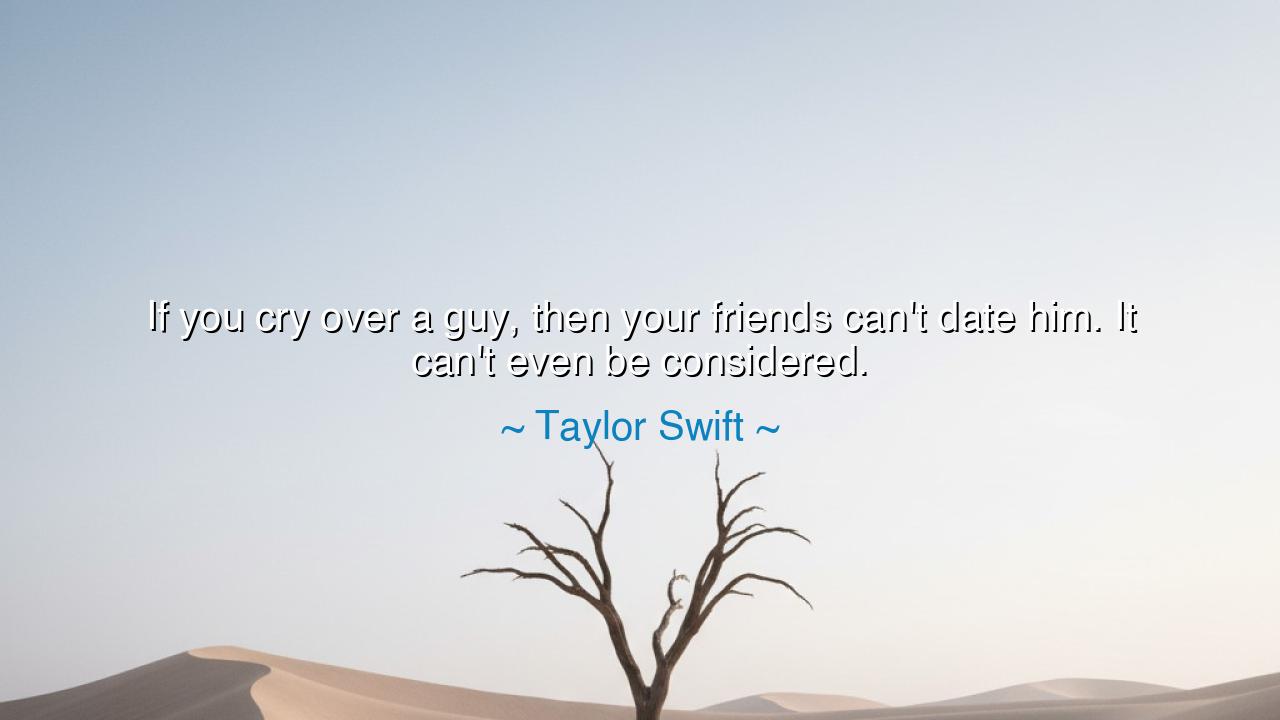
If you cry over a guy, then your friends can't date him. It can't






In the words of Taylor Swift, she declares a law both simple and sacred: “If you cry over a guy, then your friends can’t date him. It can’t even be considered.” Though spoken with the clarity of youth and the rhythm of modern life, this saying carries the weight of ancient codes — the timeless covenant of loyalty, sisterhood, and emotional honor. It is not a mere rule of romance, but a commandment of the heart, proclaiming that friendship must stand higher than desire, and that the tears of one soul are the boundaries of another’s respect.
To cry over another is to bare the soul — to confess, even without words, that one has loved, hoped, and been wounded. Such tears are sacred offerings, drawn from the temple of the heart. When Taylor speaks of forbidding a friend from courting the one who caused those tears, she is invoking the eternal law of empathy: that no bond built on trust should trespass upon another’s pain. In this way, her quote transcends the triviality of teenage heartbreak and enters the realm of moral truth. For friendship is not measured by laughter shared, but by the tears one vows to honor.
This wisdom echoes through the ages. In the ancient Greek tales, the hero Achilles mourned deeply for Patroclus, his beloved companion. And though Achilles raged against Troy, it was not for glory but for loyalty — for the bond between friends outweighed even the commands of kings and gods. To him, betrayal of that bond was the gravest sin. In Swift’s modern phrasing, we hear that same heartbeat of loyalty — a vow that says, I will not take what once broke you. I will not build joy upon the ruins of your sorrow.
Such loyalty demands strength, for the heart is easily tempted. There will come moments when desire whispers its selfish arguments — when it says, “The past is gone,” or “Love finds its own path.” But wisdom reminds us that freedom without compassion is chaos, and affection without respect is theft. True friendship is forged not in indulgence, but in restraint — in choosing compassion over conquest. Thus, when Taylor says “it can’t even be considered,” she does not speak of social etiquette; she speaks of spiritual integrity.
Consider the tale of Queen Elizabeth I and Robert Dudley. Their bond was deep, their affection undeniable. Yet when rumors arose that Dudley’s late wife, Amy Robsart, had died in mysterious sorrow, Elizabeth withdrew her favor from any notion of marriage. She knew that the shadow of grief and betrayal cannot be the foundation of love. In her wisdom, she chose the harder path — to forgo what might have been for the sake of dignity and honor. So too does Taylor Swift’s rule remind us that there are loves we must reject, not because they are impossible, but because they are unworthy of our conscience.
Yet within her words, there is also tenderness — an understanding that pain connects women across time. To comfort a friend weeping over love is to join in the sacred sisterhood that has existed since the dawn of human sorrow. When one weeps, the others guard her heart; when she heals, they rise together. This silent code is not written in law or scripture, yet it has guided generations — from the women of ancient villages who mourned together by the river, to the friends of today who wipe away each other’s mascara-streaked tears.
The lesson, therefore, is not about exclusion, but about reverence. Never build joy on another’s grief. Never trespass upon sacred tears. Love is abundant, but trust, once broken, is not easily restored. The practical path, then, is this: when your heart is stirred toward what once wounded your friend, step back, reflect, and choose loyalty over longing. Let compassion be your compass, and friendship your crown.
So let this teaching pass down as law among those who cherish truth: guard the hearts that have trusted you. Honor the tears that have fallen before your eyes. For no romance, however passionate, is worth the price of a friend’s peace. As Taylor Swift reminds us in her simple yet immortal words, if one has wept, the other must not pursue — for loyalty is the truest form of love.






AAdministratorAdministrator
Welcome, honored guests. Please leave a comment, we will respond soon